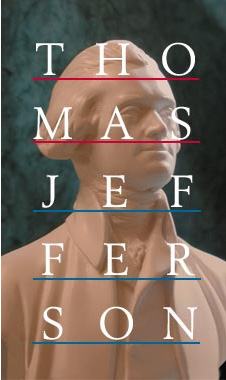Rare Book Monthly
Book Catalogue Reviews - March - 2003 Issue
Thomas Jefferson: An Exhibition on the Library of Congress Website
By Mike Stillman
He is undoubtedly one of the most important figures in our nation’s history. He is the primary author of what could be the most important written work in Americana: the Declaration of Independence. His image is one of only four (Washington, Lincoln and Theodore Roosevelt being the others) to make it to Mount Rushmore. He was once an unquestioned American icon. And he is currently the topic of a fascinating exhibition on the Library of Congress website.
Time has somewhat tarnished Thomas Jefferson’s reputation, at least in some eyes. Interestingly, the issues have little to do with his performance as a “founding father,” but much to do with his personal life. Like so many great leaders, Jefferson was a man of contradictions, high ideals not always put to practice in his personal life. Most particularly, his reputation has been damaged by fact that the author of “all men are created equal” owned slaves, and more recently by claims of paternity: DNA testing in recent years has shown a Jeffersonian father to at least one child of his slave, Sally Hemings, although some maintain that the father was Jefferson’s brother rather than Jefferson himself. The stain is exacerbated by the fact that Jefferson never set Hemings nor most other of his slaves free, as did Washington upon his death (though financial problems may have inhibited Jefferson from showing comparable generosity).
The resurgence of the reputation of John Adams, Jefferson’s rival, hasn’t helped. David McCullough’s recent biography of Adams has had a major impact on the reputation of the rival once primarily associated with the Alien and Sedition Acts. Adams’ devotion to free speech left a bit to be desired, but Adams’ loathing of slavery is much more in line with contemporary thought than was Jefferson’s ambiguous acceptance of the institution. However, as this exhibition points out, Jefferson was at least intellectually opposed to slavery and prohibited the importation of any new slaves from foreign countries on the first day this prohibition became constitutionally permissible, January 1, 1808.
Jefferson’s stand on slavery is exemplified by a letter to James Heaton on display in this exhibition. In it, Jefferson states "A good cause is often injured more by ill-timed efforts of its friends than by the arguments of its enemies . . . my sentiments have been 40 years before the public. Had I repeated them 40 times, they would only have become the more stale and thread-bare." What an excuse for not speaking out against slavery, especially from a man who rarely lacked the courage of his convictions when it came to speaking out about anything else! The exhibition also includes a letter written less than a year before his death in response to an attack on slavery by his granddaughter, where Jefferson agrees with her that "One fatal stain deforms what nature had bestowed on us of her fairest gifts." Maybe given a little more time Jefferson would have corrected the one major blot on an exemplary career.
But perhaps we dwell too long on this Jeffersonian Achilles heel. And certainly many of Jefferson’s esteemed contemporaries shared his passive acceptance of slavery. Much of our freedom has descended from the work of Jefferson, this imperfect man. In this exhibition you’ll see letters written late in Jefferson’s life explaining the principles behind the Declaration of Independence. There are documents attesting to Jefferson’s great devotion to religious liberty and separation of church and state.









